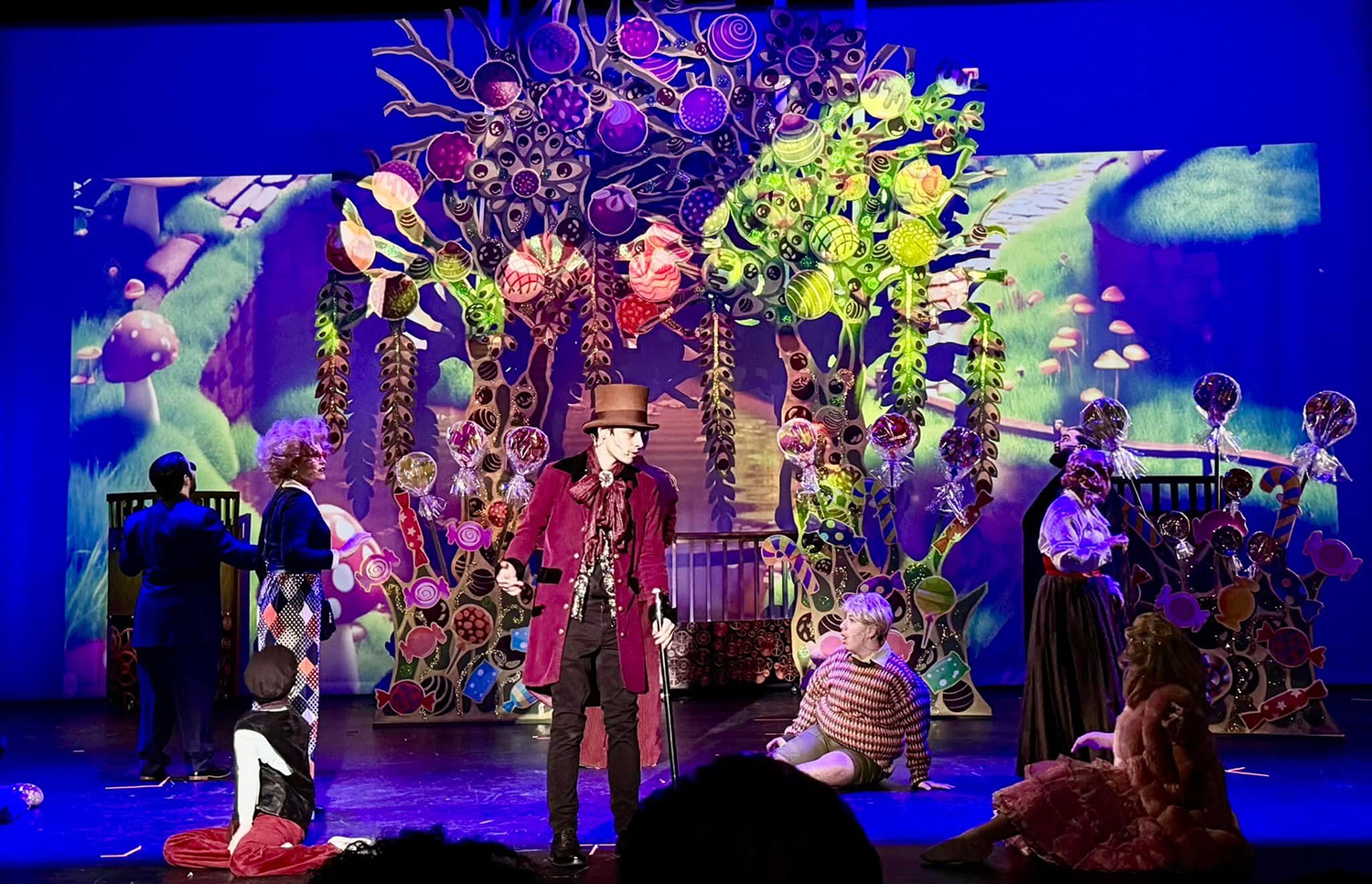
Willy Wonka (Benjamin Leon IV) deals with unruly children such as Augustus Gloop (Anthony Mallen, pictured to Wonka's left).
There is something mysterious about the chocolatier in the stage musical adaptation of “Charlie and the Chocolate Factory.” But it is hardly a mystery why people love this tale. Indeed, the story features a financially poor, likable boy who remains vibrant and positive despite the poverty conditions he and his family endure. Add other ingredients namely catchy tunes, colorful characters, as well as a plot that leaves us with hope and you have the recipe for a beloved holiday story.
You know you want to experience it and South Florida’s Loxen Entertainment is offering it, but only for a limited time. Indeed, the not-for-profit company’s respectable but imperfect professional production of the stage musical adaptation of Roald Dahl’s beloved children’s novel runs for five more performances from Thursday through Sunday.
“Charlie and the Chocolate Factory” is generally a familiar tale, but if it is new to you, a refresher could help.
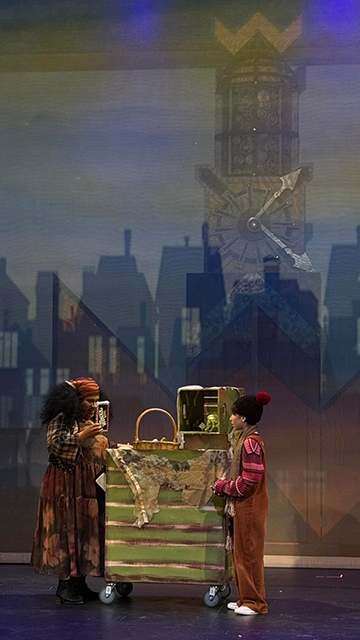
Charlie (Juliette Tudela) talks to Mrs. Green (Shelvy Paredes-Parrales) in Loxen Entertainment's current production of "Charlie and the Choclate Factory."
The titular character lives in an unnamed city during an unspecified time period with his family. The clan is so poor that they can afford little more than cabbage soup for food. But while the Bucketts may be financially poor, they are rich with love for Charlie. His grandparents regale him with tales, and talk to him about the nearby chocolate factory. Its operator, chocolatier Willy Wonka, closed it down some time ago because spies were stealing his secret recipes. But even with the factory shuttered, it has somehow remained operational.
Shortly after the show opens, Wonka announces that he is re-opening the factory and inviting five lucky children to tour it. With that in mind, he has hidden five golden tickets within his chocolate bars sold in stores. Those who buy the bars containing the tickets will be the lucky ones.
The first winners appear to be obnoxious kids, suggesting that sometimes undeserving people attain life’s pleasures. But just when it seemed as though all the tickets were gone, Charlie finds the last ticket suggesting that with patience and perseverance, good things sometimes happen.
During the tour, the spoiled children prove to be greedy, impatient, and impulsive. For instance, they touch and even eat what Wonka has on display in the factory, despite Wonka’s hands off rules. But the Wonka proves to be a patient, polite, and mature boy who wins the chocolatier over. As a result, there's a big reward by the tale’s end.
Hopefully, by the time you read this, the production’s sound issues will be gone. Unfortunately, during the reviewed performance, the sound cut in and out several times. In addition, we may question why Ricky J. Martinez, in an otherwise vibrant, warm, and convincing performance as Grandpa Joe, speaks with a southern accent. True, the setting is not specific, but the set design by Pedro Balmaseda and Jorge Noa suggests that Loxen’s production takes place in a big city, perhaps London. Some of the actors' portrayals are too over-the-top.
But even with these issues, there is no disputing the energy of Loxen’s cast and the talent on stage.
Certainly, one of this production’s stars is Juliette Tudela as the title character. She imbues young Charlie with convincing enthusiasm and wholesomeness. Also, this child performer demonstrates naturalness and the kind of stage presence usually associated with older performers. In addition, she has a clear, sweet voice, but does not rely on cuteness to win over audiences.
Judging from her appearance and how she sounds, Tudela could easily pass for a boy. However, Charlie could be female with the name short for, perhaps, Charlotte or Charlene.
The titular character appears in almost every scene, so the performer playing him (or her) must possess the endurance to handle a major role. Undoubtedly, Tudela demonstrates that stamina.
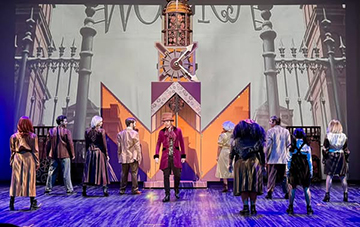
Willy Wonka (Benjamin Leon IV) appears at the entrance to his factory, signaling the start of the tour.
In addition to Tudela, Loxen’s cast features mostly young local actors who deliver vivacious performances. They showcase the thespians’ versatility.
Loxen’s founder and CEO, Benjamin Leon IV, portrays the enigmatic Willy Wonka. Also, the large cast includes Sara Jarrel as Mrs. Bucket, Charlie’s mother, Cam Davis as Violet Beauregarde, David Llamazares as Mike Teavee, Anthony Mallen as Agustus Gloop, Zoey Carria as Veruca Salt, Fabiana Cueto as Mrs. Gloop and Grandma Georgina, Irene Gonzalez as Mrs. Teavee and Grandma Josephine, Daniel Martinez as Mr. Salt, Justin Rodriguez as Mr. Beauregarde and Grandpa George, Shelvy Paredes-Parrales as Mrs. Green, and Josie Somoza as Jerry Jubilee.
Members of the ensemble include Elizabeth Chavez, Sarita Alvarez, Gianfranco Di Marcico, Melissa Gomez, Genesis Guzman, Beverly Hodgson, Sabrina Leon, Sorangel Munoz, Emmanuel Perez, and Lito Becerra.
The production’s director is Damaris Lopez-Canales, while the choreographer is Imran Hylton, and the musical conductor is Johann-Sebastian Guzman.
A vibrant and skilled live orchestra accompanies the performers in song without drowning them out. The performers generally possess pleasant, strong, and expressive singing voices. Mostly, we can hear and understand them.
You may recognize some of the musical numbers from the 1971 movie version starring Gene Wilder as Willy Wonka and Peter Ostrum as Charlie. Specifically, the upbeat song “The Candy Man” the celebratory “I’ve Got a Golden Ticket,” the otherworldly “Pure Imagination,” and the memorable Oompa Loompa songs remain in the live show. It also features new numbers like the hopeful “A Letter from Charlie Bucket” the tender “If Your Father Were Here” and the fun patter song “Strike That! Reverse It!”
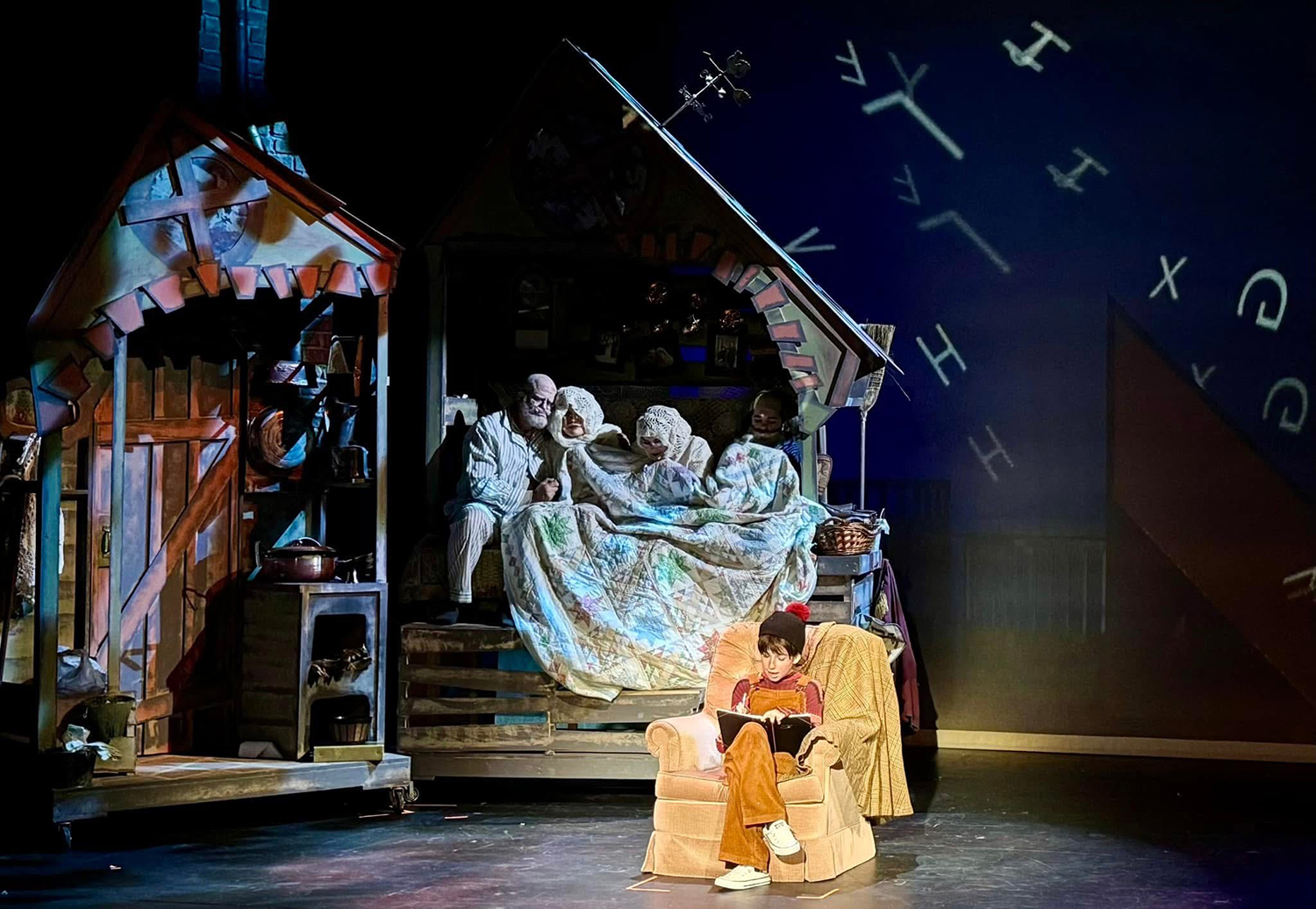
Charlie (Juliette Tudela) reads as his grandparents huddle together in bed.
The latter song’s fast pace and lyrics could trip up inexperienced performers. However, Leon nails it; he sings fast enough for a patter song but ensures that we can not only hear but understand what he is singing.
Speaking of Wonka, you may recall Wilder’s flamboyant performance with a hint of mystery in the 1971 film, and Johnny Depp’s oddly child-like, eccentric portrayal of the chocolatier in the 2005 Tim Burton-directed movie.
Fortunately, Leon makes the part his own. He imbues the role with just enough of a mysterious, sly quality to make the man an enigma. Leon’s Wonka is also nimble, charismatic, unpredictable, and a cross-between a fast-talking salesman a la Harold Hill and an animated magician. With brown eyes and hair, and sporting a top hat, Leon’s Wonka commands attention without upstaging other actors.
Generally, Martinez lends Grandpa Joe vitality and the kind of optimistic, loving quality we all wish our grandparents had. Certainly, Martinez and Tudela convey a believable grandpa-grandchild bond, and this benefits them during moving songs such as “Charlie, You and I.”
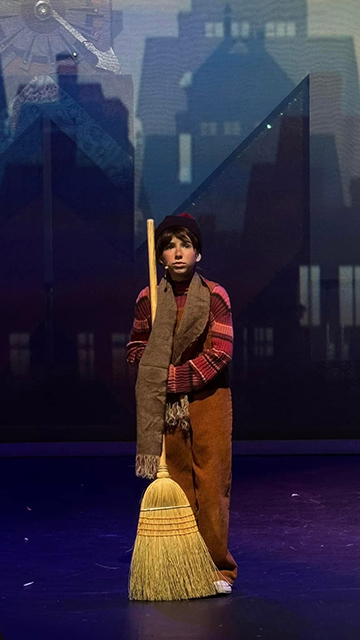
Charlie (Juliette Tudela) cannot just sweep away all of his problems but proves to be a lucky lad.
Jarrell beautifully captures Mrs. Buckett’s sincerity, and she sings “If Your Father Were Here” with a mother’s affection.
Other cast members offering winning performances include Llamazares. He looks young enough to believably play pre-teen Mike Teavee. The performer’s portrayal calls to mind an ADHD-afflicted teenager who cannot wait to leave a clothing store so he can play video games.
Lopez-Canales’s dynamic direction befits this energetic show, as does Hylton’s vigorous choreography, which cast members look natural performing. The assistant choreographer is Sabrina Leon.
Balmaseda and Noa’s set design includes a backdrop of what resembles a large city. In addition, stand alone set pieces indicate locations such as the Buckett household. It appears small and cramped; it is obviously not big enough for the Buckett family.
If a theater company lacks a large budget, it can be hard to offer the truly eye-popping visual effects one may expect to experience in this show. After all, we must wait an entire act to see Wonka’s much-hyped, extraordinary factory, so many audiences may want the effects to truly blow them away.
In Loxen’s case, the scenic design depicts a stately factory with pleasing visuals, but nothing that will leave you truly in awe. Perhaps the projection design could have gone further to depict stunning effects. The program does not credit a projection designer, but the projections generally serve the production well with attention-getting effects.
In the lighting department, designer Ernesto Pinto deftly adjusts the lighting to suit a particular scene’s needs. For example, the lighting is dim during the personal and affectionate number, “If Your Father Were Here” and brighter during more upbeat songs.
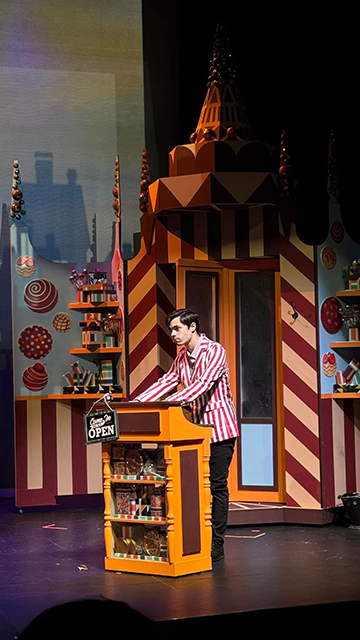
In addition to portraying Willy Wonka, Benjamin Leon IV appears as a mysterious candy store operator.
Costume designer Corey Vega’s clothes are as varied as the characters. And certain outfits help some characters stand out more than others. Those who remain hidden include the grandparents other than Grandpa Joe. They wear hoods, perhaps to suggest their advanced age (in the novel, Dahl, with his dark humor, suggests that they are ancient).
The faithful stage musical adaptation of “Charlie and the Chocolate Factory” is not a great musical. It includes, for instance, tiresome jokes such as “I thought you might have kicked the bucket, Buckett!,” which a candy salesman says after not seeing one of the characters for a while. And how often have we heard an aging character say, “I’ll take the obituaries” when a household divvies up a newspaper? One of the grandparents instantly asks for the obituaries after the paper arrives in the Buckett household.
While the source material may be a children’s novel, the story includes themes that adults will appreciate. Certainly, the tale suggests that we should remain hopeful even in seemingly dire situations. In addition, Dahl takes aim at bad parenting and includes legacy as a theme.
But mostly, “Charlie and the Chocolate Family” is a fun, feel-good story with likable characters and memorable music. With that in mind, Loxen’s production is one of this holiday season’s golden tickets in South Florida.
If You Go:
- What: Loxen Entertainment’s production of “Charlie and the Chocolate Factory.”
- When: Through Dec. 22. Remaining performances are at 8 p.m. Thursday, Friday, and Saturday, as well as 1 p.m. Saturday and Sunday.
- Where: Colony Theatre, 1040 Lincoln Road in Miami Beach.
- Tickets: Go to www.loxen.org.
 MAIN MENU
MAIN MENU

